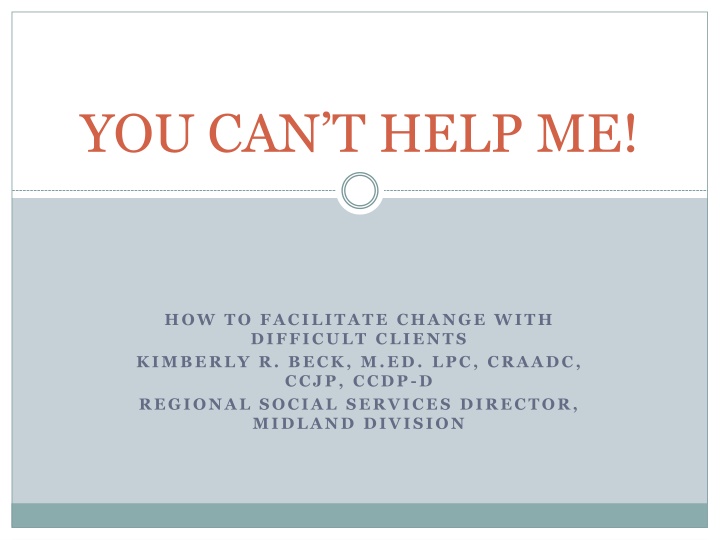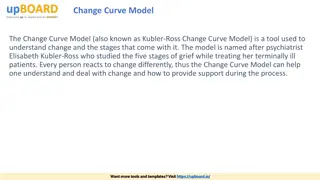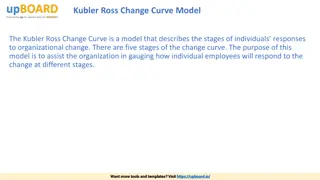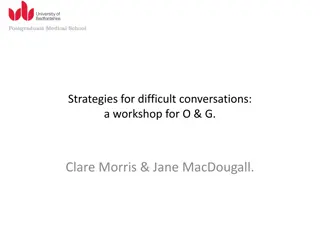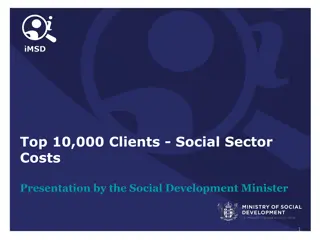Facilitating Change with Difficult Clients: Strategies for Success
strategies to effectively manage difficult clients in social services, focusing on behavior patterns, responses, and counterstrategies. Get insights on skill acquisition and client outcomes from professional development training.
Download Presentation

Please find below an Image/Link to download the presentation.
The content on the website is provided AS IS for your information and personal use only. It may not be sold, licensed, or shared on other websites without obtaining consent from the author.If you encounter any issues during the download, it is possible that the publisher has removed the file from their server.
You are allowed to download the files provided on this website for personal or commercial use, subject to the condition that they are used lawfully. All files are the property of their respective owners.
The content on the website is provided AS IS for your information and personal use only. It may not be sold, licensed, or shared on other websites without obtaining consent from the author.
E N D
Presentation Transcript
YOU CANT HELP ME! HOW TO FACILITATE CHANGE WITH DIFFICULT CLIENTS KIMBERLY R. BECK, M.ED. LPC, CRAADC, CCJP, CCDP-D REGIONAL SOCIAL SERVICES DIRECTOR, MIDLAND DIVISION
INTRODUCTION Masters Degree in Counseling Boston University Bachelor of Science in Psychology University of Maryland Doctoral Candidate in Counseling University of Missouri St. Louis Emphasis Areas Addiction Marriage and Family Crisis Intervention Veterans Homeless At- Risk Youth Professional Development
LEARNING OBJECTIVES ARTICULATE BEHAVIORAL PATTERNS AND CHARACTERISTICS OF PEOPLE WHO TEND TO BE RESISTANT/DIFFICULT EXPLAIN COMMON RESPONSES TO DIFFICULT CLIENTS AND ARTICULATE MORE EFFECTIVE RESPONSES TO THAT BEHAVIOR EVALUATE STRATEGIES COUNSELORS/CASE MANAGERS CAN USE TO EFFECTIVELY COUNTER THE DIFFICULT BEHAVIOR AND DISENGAGEMENT PRACTICE UTILIZATION OF STRATEGIES THROUGH ROLE PLAY IN SMALL GROUPS
REALITY CHECK Professional Development Training is often delivered via a one-time clinical workshop. Is it realistic to believe that practitioners will actually acquire skillfulness through such training? Study by William Miller ant Kathy Mount () suggest the following: -on paper and pencil measures participants reported large increase in skills - observational measures reflected more modest changes in practice -clients did not show the responses changes that were found to be predictive of better outcomes of the skill attainment
PRE-TEST 1) Gather information about your knowledge of the topic prior to participating in the training 2) To call your attention to topic areas prior to participation in the training 3)Wake you up after lunch by scaring you half to death! Please take a few minutes to complete this and do not share answers with your neighbors
Ice-Breaker Your Name Your Position Your Location Describe your most challenging client Tell us what you want from this training
What Makes A Case Difficult? Diagnostic dilemma Poor prognosis Multiple problems Lack of interagency coordination Involuntary participation Lack of Progress Malingering and Deception
What Makes A Case Difficult? Imminent danger Cultural competency gaps Conflicting ethical principals Eligibility limitations Limited resources Unacceptable client expectations
Natural Categories of Difficult Cases Challenges to the professional s skill Challenges to the professional s personality Unmatched expectations System issues such as eligibility and coordination problems Physically dangerous clients Legally dangerous clients Socially dangerous clients
Six Categories of Intervention A. Authoritative Categories i. Prescriptive interventions ii. Informative interventions Ii. Confrontational interventions A. B. C. B. Facilitative categories i. Cathartic interventions ii. Catalytic interventions iii. Supportive interventions
Degenerate Types of Interventions 1) Unsolicited 2) Manipulative 3) Compulsive 4) Unskilled
Degenerate Classes of the six categories Authoritative categories Prescriptive Degeneration Benevolent take-over Moralistic oppression Informative Degeneration Seductive over-teach Oppressive over-teach Confronting Degeneration Sledgehammer Smiling demolition (the smiler)
Degenerate Classes of the six categories Facilitative Cathartic Degeneration Encouraging dramatisation Nut cracking (too deep too soon) Catalytic Degeneration Implicit take-over (the compulsive search for order) Scraping the bowl Supportive Degeneration Moral patronage (or your character is coming along nicely) Qualified Support
I JUST WANT TO HELP YOU! Why are clients difficult and resistant when all we are trying to do is help them? Why do some clients come in for help with the attitude or notion that You can t help me! Resistant client behavior seems to conform to Newton s third law of motion: For every force there is an equal and opposite counter force. In a mode in which overcoming resistance potentially becomes a contest, the client will often win. Cowan and Presbury, 2000, p. 412
I JUST WANT TO HELP YOU! We tell our clients things like, You can t change other people; you can only change yourself. Then we go into a session trying to change our clients. This is hypocritical. I teach, You can t change your clients. You can only change how you interact with your clients and hope that change results. That s all you get Clifton Mtichell Effective Techniques for Dealing With Highly Difficult Clients
Whos Who of Difficult Clients Intimidating clients Critical clients Rageful clients Threatening clients Autonomous clients Acting-out clients
Whos Who of Difficult Clients Wealthy, influential clients Angry victim with cultural or gender differences Uncooperative clients Passive-Aggressive clients Mistrustful clients Unempathic clients
Reasons Clients Are Resistant Fear Fear of Failure Fear of Success Fear of taking risk Fear of change Manipulation Passive-aggressive behavior Shame Jealousy or desire to sabotage the relationship
Reasons Clients Are Resistant Exhaustion A personality style Lack of options Cultural and value differences Over-reaction Impaired by chemicals or catastrophic mental illness Emotional paralysis Limited approaches Needs are met
Reasons Clients Are Resistant Conflict gains attention Ignorance The familiarity trap
Creating Lasting Change People rarely change because of the logic of the situation; people change when they have an emotionally compelling reason. Clifton Mitchell
The Therapeutic Alliance The counselor client relationship is key to helping the client move forward. Clients are less resistant if they feel connected to the counselor. If the client will not disclose their inner wants, actions, feelings and thinking, change is very difficult. Robert Wubbolding- Director of Training William Glasser Institute
Its All About You! Start with self-awareness Understand the concept of change Sharpen the Saw (Practice, Practice, Practice)
General Principles for Dealing with Resistance Do the Unexpected Slow the Pace, Focus on the Details, Process feelings relative to meaning Treat Clients Resistance with Respect Maintain an Attitude of Na ve Puzzlement Never Label Clients with Terms that Imply Resistance Focus Where Clients Are Stuck Frame All Desires in the Positive If they are not confused, Confuse them Resist the Urge to confront Initially CLIFTON MITCHELL
11 Solutions For Counseling Difficult Clients Eliminate the Power struggle Feed Your Clients Therapeutic Big MAC s Teaching is Counseling Stop Believing In Denial Use Strengths to Compensate for Deficits Motivation Is the Key to Change Give Your Clients A Million Dollars Paradoxical Interventions Bring In Others Healthy Modeling Let the Train Wreck Happen RICHARD K NONFARD
FRAMES Feedback is given to the individual about personal risk or impairment. Responsibility for change is placed on the participant. Advice to change is given by the provider. Menu of alternative self-help or treatment options is offered to the participant. Empathic style is used in counseling. Self-efficacy or optimistic empowerment is engendered in the participant. Source: Miller and Sanchez, 1993
Motivational Enhancement Techniques Ask Open Ended Questions Use Affirmations Use Reflective Listening, Reframing, Roll With Resistance Summarizing
Closing Thoughts How does a therapist (case manager) position himself or herself to work with reluctant clients? How does he or she react to clients who potentially challenge his or her sense of power, confidence, and effectiveness as a therapist (case manager)? (Wessler, Hankin &Stern, 2001) Self-awareness/reflection, education/training, practice, practice, practice, feedback/evaluation .continually
Lets Practice Group Work
Post -Test Demonstrate an understanding of the material presented in the workshop Officially document your participation in the workshop Freak you out at the end of the workshop!
Resources Succeeding With Difficult Clients Applications of Cognitive Appraisal Therapy - Wessler, Hankin & Stern A Small Study of Training in Motivational Interviewing: Does One Workshop Change Clinical and Client Behavior? Miller and Mount Managing resistant Clients Lynne Shallcross , Counseling Today February 2010 11 Solutions for Counseling Difficult Clients, Richard K. Nongard Effective Techniques for Dealing With Highly Resistant Clients, Clifton Mitchell, 2006 Heron, J (2001) (5th ed) Helping the client a creative practical guide.
Contact Information Kimberly R. Beck 314-646-3154 work 314-960-2530 cell Kimberly_Beck@usc.salvationarmy.org Thank You!!!!!!!!!!!!!!!!!
